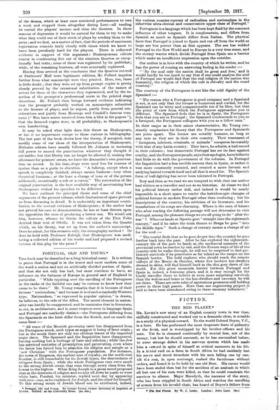FICTION.
THE RED PLANET.*
Ma. Locxx's new story of an English country town in war time. skilfully oonstruoted and worked out to a dramatic close, is notable as a study of a physical coward. To the world Colonel Boyce, 1T.C., is a hero. He has performed the most desperate feats of gallantry at the front, and is worshipped by his brother-officers and his men. Yet he is obsessed continually by mortal fear, not of the enemy, but lost he should succumb, as he has succumbed before, to some strange defect in his nervous system which has made him a c oward in spite of himself at critical moments in his life. In a trivial raid on a farm in South Africa he had suddenly lost his nerve and stood irresolute with his men falling one by one, till the rest, in open oontompt, rushed the farmhouse without orders, and found it to be held by one old Boer. His career would have been ended then but for the accident of an ambush in which all but one of his men were killed, so that he could constrain the survivor to silence. Major Meredyth, the narrator of the story, who has been crippled in South Africa and watches the unrolling of events from his invalid chair, has heard of Boyce's failure from
• The lied Plant. By 'W. J. 'Locke. London: John Lane. 165.1 the survivor lyingwounded in Cape Town; but as the storyproeeeds he and the other men who {mow of the scandal become gradually convinced by the new evidence from Francs that Boyce must have been grossly maligned. Meredyth tries to overcome his instinctive repugnance for the big, clever, agreeable man who is a model son to his widowed mother, and who seems to cling desperately to Meredyth as to a father-confessor to whom he may unburden his soul by degrees. We need not reveal the secret of Mr. Locke's plot, which starts with the finding of the squire's daughter drowned in the canal; but Boyce's dual personality, in which fierce courage and pitiful weakness predominate alter- nately, obviously counts for mush. Boyce's triumphant reception by the townsfolk, with the squire in the chair, when he returns, blinded, with the V.C. that he had won in rescuing wounded mon, is admirably described with something of that tragic irony which Aeschylus taught us to see attendant on human pride. Betty, the heroine, a very modern young woman who breaks with Boyce, marries another young officer, as she thinks, for her country's good, but perhaps also from a simpler feminine motive, and is speedily left a war-widow, is an amusing and attractive figure. In her ease it is not altogether clear that a deep affection for Boyce is modified by an unconscious dislike of the grosser side of his nature ; but the suggestion that after giving him up she should take pity on him in his blindness and be almost ready to rnrwryhim seems natural enough. Meredyth, who is inclined to be prosy, and his devoted servant Sergeant Marigold—a modern Corporal Trim—are an entertaining couple, and Mr. Locke has described in his wittiest manner the young University dilettante who annoys Meredyth by his seeming indifference to the war, and then dis- appears, to return, after a long absence, as a mud-caked private with the D.C.M. and the promise of a commission. The Red Planet reflects the passing opinion of the time with considerable skill, as in this little outburst of Meredyth's when the voluntary recruiting policy was becoming exhausted :—
" If a man has never been taught that Ile has a country, how the deuce do you expect him to love her—still lees to defend her with his blood ? Our more than damnable governments for the last thirty years have done everything in their power to crush in English hearts the national spirit of England. God knows I have no quarrel with Scotland, Ireland and Wales. I speak in no disparage- ment of them. Quite the reverse. In this war they have given freely of their blood. I only speak as an Englishman of England, the great Mother of the Empire. Scot, Irishman, Welshman, Canadian, Australian are filled with the pride of their nationality. It is part of their being. Wisely they have been trained to it from infancy. England, who is far bigger, far more powerful than the whole lot of them put together—it's a statistical fact—has deliberately sunk herself in her own esteem, in her own pride. The cultivation of English patriotism has been discouraged by the Little Folk, its expression sneered at, and, in many cases, forbidden in the Nation's Schools. This criminal self-effacement of England is at the root of the peril of the British Empire during this war." Meredyth's complaint is exaggerated ; it is not indeed a true Englishman's complaint, for jealousy is no more an English national vice than boasting. But there have been times when the War Office and the newspaper correspondents between them, by giving prominence to the work of all troops save the English county regiments, have not only misled neutral opinion, but have compelled Englishmen to point out, more in amusement than in anger, that England still contains for more than half the white population of the Empire and is bearing her full share of the burdens of war.



































 Previous page
Previous page